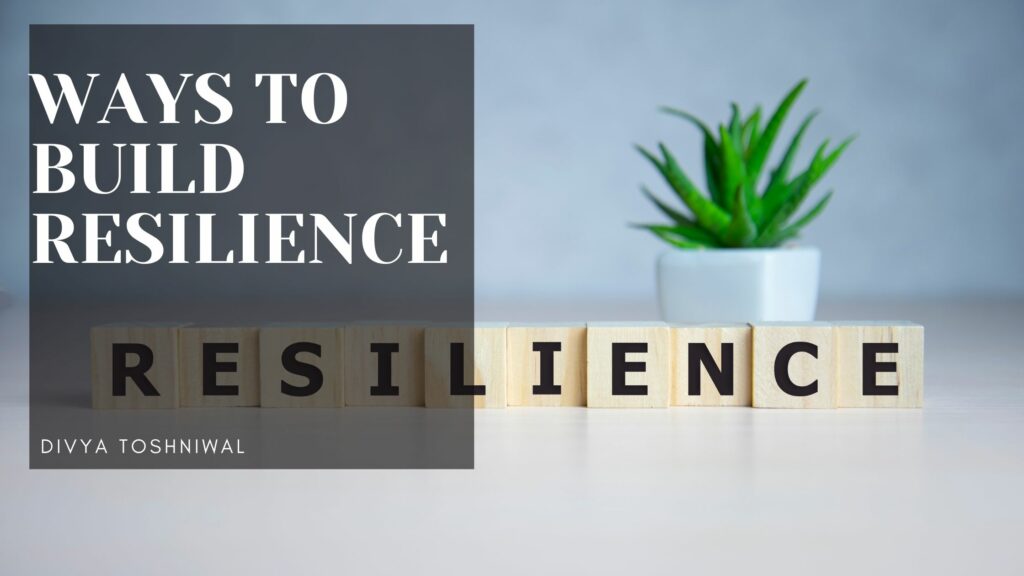What you are today, is a result of what you have experienced in life. Your entire life and all its experiences have impacted how you think and behave today. So in short, whatever happens with you builds you the way you are. Although the entire world tells me this, I somehow do not believe it to be entirely true. If this is true then how can 2 people who have suffered the same trauma behave differently in life?
I believe that the external impacts you only to a certain extent and the rest is determined by how you react to the situations. A big deal of it depends on your psychological resilience. Psychological or Emotional resilience is the capacity to cope with a crisis situation or a stressful situation and return to a stable mental or emotional state. Resilience helps you to adapt to changing situations and build strength.
Some say resilience is inherited while some say it can be developed in later stages of life. I believe both statements are true. What you have inherited cannot be changed but what you can do is work on developing by taking help from your environment, specialists, and your own commitment towards personal development.
The oak fought the wind and was broken, the willow bent when it must and survived.
Robert Jordan
What is Resilience?
Resilience is the ability to use your mental and behavioral processes such that they help you deal with stressful situations and overcome the crisis in a smooth and balanced manner. This state of mind can change based on varied experiences in our life. Some people may develop endurance over time with day-to-day changes and crises while some may entirely lose their power of resilience to any traumatic situation. The environment you live in and the people you surround yourself with are major factors in building or diminishing your resilience over time.
Ways To Build Resilience
Though resilience cannot be created overnight, there are various ways to develop our psychological and emotional resilience. Working with a therapist or personal coach is one of the best ways to do it but other than that here are a few ways you can start on your way to building resilience.
Emotional Awareness
The first step to building resilience is to understand yourself and your emotions well. You first need to identify how you respond to any external stressors in life and what you truly feel about them. Be honest towards yourself and your emotions. Know your emotional strengths and weaknesses, understand emotional intelligence and work on developing it. Learn about the full spectrum of emotions and also learn to express them well.
Interpersonal Relationships
The people you spend your time with and how your relationships are with them can be very impactful on building your resilience. Being around people who suck up your positive energy or are negative in their own lives can be hazardous for your mental health and resilience. Learn how to identify such energy vampires and the ways to deal with such negative people.
Being around positive people and people who can support you in your hard times increases your chances of managing the crisis by multiples.
Avoid Overthinking
Getting out of your head is a good point to start while practicing to build resilience. Our own minds can be our best friends or our worst enemy. Life is full of ups and downs, it will have some positive thoughts and some negatives. It is always easier to fall prey to stressful and pessimistic thoughts and ruminate them over and over again. This spiral can lead to weakening your endurance levels for any external stressors.
You can read about the patterns of overthinking here and the ways you can overcome overthinking here.
Self-care
Learn to relax and give yourself some time. Do not overwork your mind. Self-care helps you to replenish your energy and direct it to higher productivity. When you focus on all-around self-care including its physical, mental, emotional, spiritual, and all other aspects it gives you a sense of completeness. Get regular sleep, engage in physical activities, eat healthy meals, listen to music that soothes you, make an effort to have fun, do the activities that make you feel good about yourself. A well-balanced self-care plan can help you refill your energies and build resilience.
Set Realistic Goals
Knowing your limitations is not putting yourself down. It is in fact the opposite. Do not burden yourself with unrealistic goals and expectations that lead to nothing but disappointments. Set your goals in consideration of your purpose, abilities, and capabilities. Check out these posts on achieving goals. these will help you to set realistic goals and achieve them.
Optimistic Outlook
By suggesting to have an optimistic outlook I do not promote having wishful thinking. The need is to be practically optimistic and not allow the toxic positivity all around to put you down. You don’t have to think positively about every adverse situation. Acceptance of the bad is also an important aspect of building resilience. Having a positive outlook is good in order to find the purpose behind the pain.
Long-Term Vision
Have a long term-vision for every crisis you face and every decision you make. The instant emotional reaction can be taken over with logical and factual thinking. The things that are causing panic in this instance, may not even be relevant in a few months, days, or even a few hours. Having a long-term vision will help you deal with the instant surge of emotions that you are facing and help you to build resilience.
These few tips will help you build resilience and deal with the stressors of life in an efficient manner.
